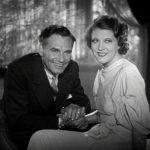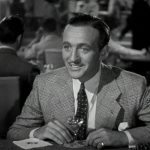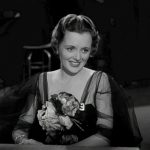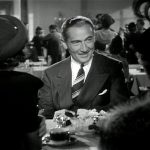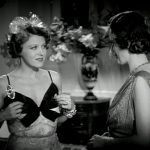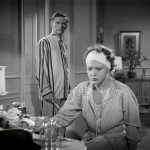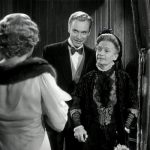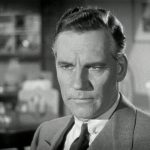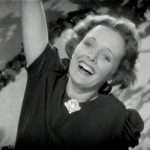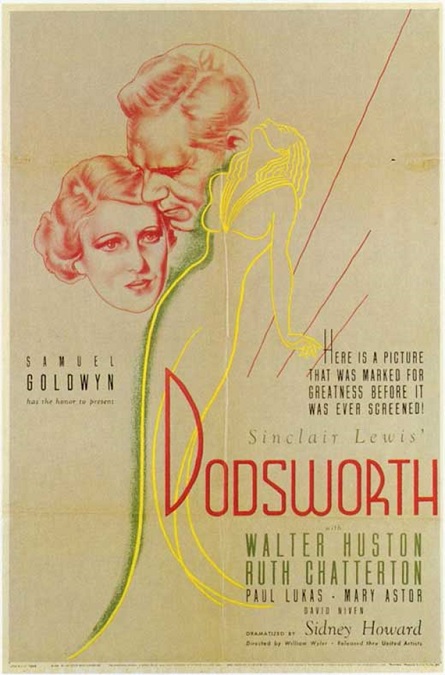

Dodsworth – 1936
OK, Dodsworth’s wife is a lying, cheating, whore. There, I said it. The movie is supposed to be an examination of a marriage that is on the rocks, but I could only buy that if both people contributed to the union’s failure. In this case, the wife was really the only problem, and the husband tried to be responsible, loyal, loving, and above all, patient. When the film began, I knew nothing about the plot.
I hoped it would be a biopic of a man and his career as an automobile manufacturer. Apparently, I wasn’t even close. Within the first few minutes, we see Sam Dodsworth, played by Walter Huston, as he retires and leaves his job behind him. He comes home to his wife, Fran, played by Ruth Chatterton, and the two seem to be blissfully happy as they look forward to traveling the world, something they never got to do when Sam was working. As Sam doesn’t like to fly, they book passage on a trans-Atlantic cruise ship.
While on the boat, they meet Captain Lockert, played by a very young David Niven. He and Frances hit it off while Sam is having the time of his life, experiencing the travel with the wonder and excitement of a child. Fran thinks of him as a country hick, and is embarrassed by his behavior. She wants to become a member of the French bourgeoisie. Before the voyage is over, Lockert makes a pass at her and kisses her.
True, she rebuffs his advances, but the seed is planted. From there, she acts immaturely, saying that she is still young and wants to live. She wants to be a party girl, afraid of being perceived as old. She plays things fast and loose, and starts an affair with Arnold Iselin, played by Paul Lukas. But Sam isn’t the jealous type. He knows of her indiscretions and allows them, showing his own character flaw. We can see a clear pattern develop, and the rest of the film is about how Fran keeps cheating on her husband, and running back to him whenever her affairs go sour.
After her relationship with Iselin goes bad, she apologizes to Sam and he agrees to take her back. But within twenty-four hours, she starts an affair with Kurt Von Obersdorf, played by Gregory Gaye. Sam steps aside again, and Fran very nearly marries her new lover. However, Kurt’s mother, the Baroness, played by Hollywood’s favorite foreign old lady, Maria Ouspenskaya. I love her every time I see her, and this time was no exception. She sees through Fran’s civil veneer, and pegs her as the lying, cheating whore that she is. She forbids the marriage and Kurt leaves her.
So Fran runs back to Sam. But after being mistreated for so long, Sam meets Edith Cortright, played by Mary Astor. He resists falling in love with her, but she eventually proves to be a better match for him than Fran could ever be. In the film’s climax, Fran once again tries to reel Sam back in. Sam tries to do the right thing, and leaves Edith to return to the woman who is, after all, his wife. But when Fran fails to apologize for her behavior, and then blames Sam for her own infidelity, he finally comes to his senses and returns to Edith. Happy ending!
And as far as I can tell, the movie is trying to ask the question, who is to blame? Is Sam at fault since he is weak-willed, and drove her to cheat because he spent too many years being an inattentive husband while he was amassing his fortune? Or was Francis responsible for her own cheating behavior? Obviously, I tend to lean in that direction. Sam is only to blame for continually taking her back whenever she cheats on him.
So, the story was passable, and I think typical of films from the 1930s. There was a bit of romance and a bit of drama. And there was definitely wish fulfillment as all the characters had plenty of money and lived in large mansions or spacious country villas on foreign shores. To match the great, high-class filming locations, the costumes were all expensive and glamorous. The wild and carefree Fran was always dressed in sparkly gowns and dazzling jewels.
I have to make mention of a great little scene in which Sam and Fran are hosting a party. Among others, Iselin and Edith are in attendance. Edith says, “I hadn’t realized it was your birthday.” Fran slyly says, “No? Wish I hadn’t. No woman enjoys getting to be thirty-five.” Edith gives her a perfect look that says, “Thirty-five?!?! Who on earth do you think you’re fooling, lady?” But her actual response is classy and well-delivered. She says, “When you’re my age, you’ll look back at thirty-five as a most agreeable time of life, Mrs. Dodsworth.” Fran reposts, “I hope I look as young as you do… when I’m your age.” Again, Edith avoids taking the bait, saying, “You’re almost sure to, my dear.” And that little exchange, I think, is also indicative of films from that era. It was clever, witty, and very telling of a character’s personality, without clumsy or forced exposition. And all that is to say that even though the film was average, at best, it still had a charm that we rarely see in modern filmmaking.
